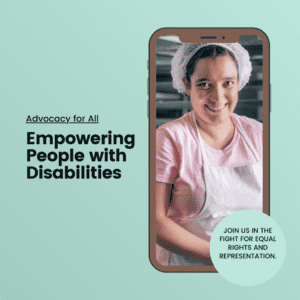Thanksgiving is approaching, and families gather around the dinner table, sharing stories and side dishes. It’s also a time to remember those no longer with us, whose influence shaped our lives in positive and challenging ways.
Grateful for the fight.
The past several months have been challenging for Mikelle and me as we’ve navigated some unexpected complications with her funding and support services. Despite these difficulties, I find gratitude in the struggle—it signifies that we have something valuable at stake, a stark contrast to the situation some forty years ago when such support was nonexistent. Back then, I spend my days as a professional fundraiser. c
So, despite the recent challenges, Mikelle and I are taking a moment this month to appreciate the significant advancements and systems that have been developed over the last 60 years to support individuals with disabilities in leading self-determined lives.
Sixty years of progress.
The progress in this field has been substantial. We now emphasize inclusivity, accessibility, and empowerment for individuals with diverse abilities, moving away from segregated services and institutional care.
Various technologies, policies, and societal changes have played crucial roles in improving the lives of people with disabilities. For instance:
- Assistive Technologies: The development of assistive technologies, such as screen readers, voice recognition software, and adaptive devices, has dramatically enhanced the independence of individuals with disabilities in various aspects of life, including education and employment.
- Legislation and Policies: Legal frameworks, such as the Americans with Disabilities Act (ADA) in the United States, have been instrumental in promoting equal opportunities and accessibility. Similar laws and policies in other countries aim to eliminate discrimination and ensure that people with disabilities have the same rights and opportunities as everyone else.
- Inclusive Education: Efforts have been made to create inclusive educational environments that cater to the diverse needs of students with disabilities. These include accessible learning materials, accommodations, and support services to ensure that everyone has the opportunity to learn and thrive.
- Social Awareness and Acceptance: Increased awareness and a shift in societal attitudes toward disability have contributed to creating more inclusive communities. Breaking down stigmas and promoting acceptance fosters an environment where individuals with disabilities can actively participate in social, cultural, and economic activities.
- Employment Opportunities: Initiatives to promote workplace diversity and inclusion have opened up more employment opportunities for people with disabilities. Companies are recognizing the value of a diverse workforce and are implementing measures to accommodate and support employees with disabilities.
- Advocacy and Support Organizations: Various advocacy groups and support organizations have played a crucial role in championing the rights of people with disabilities. They work to raise awareness, provide resources, and advocate for policy changes to improve the lives of individuals with disabilities.
The Fight isn’t Over.
It is crucial to build on these achievements, foster innovation, and promote a world that is inclusive and accessible to all. The journey towards greater empowerment and self-determination for people with disabilities continues, and acknowledging our progress is a testament to our collective efforts.
Enjoy your family and the celebrations this month. Please take a moment to quietly raise a toast to all that we have achieved together.

